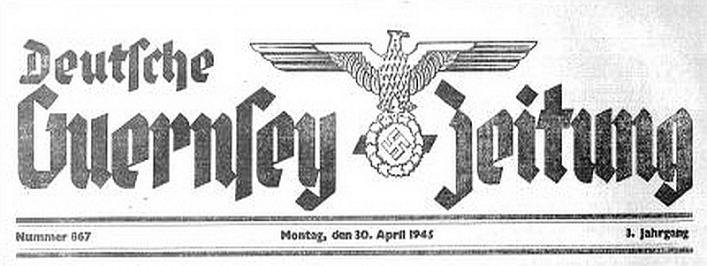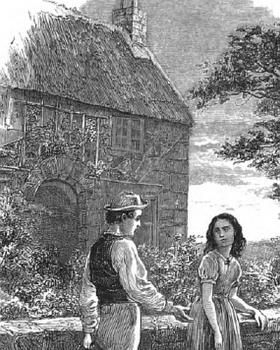From an unknown newspaper [Guernsey Press?] of January 10th, 1939, in Carol Toms' scrapbook I., 'Famous L'Invention of Guernsey.' 'Fastest ship of her day, probably the first four master to carry yards on all her masts, the famous Guernsey ship L'Invention is picturised in the Guernsey Museum and a similar picture was used as Christmas cards by 'The Cachalot's' Club,' of Southampton.'
From The Star, August 31, 1915.
The proprietor of the short-lived but interesting newpaper Le Publiciste, the printer and publisher Thomas Greenslade, published a letter in his newspaper on 26th December 1812, highlighting his disagreement with his editor, Thomas de la Rue. De la Rue was busy starting up his own newspaper in Guernsey, Le Miroir Politique, which had its first issue in February 1813, and went on to found the printing company that still bears his name.
The Star, June 15th, 1915. Not entirely accurate!
Deutsche Guernsey Zeitung, The Guernsey Press, Guernsey, 1942-45; Deutsches Leben, Guernsey, 1943; and other materials produced by or for the occupying forces, 1940-45. [By Dinah Bott]
From the Guernsey Free Churchman, November 1935, p. 80. Written originally in French by George Rabey.
From The Terrific Record and Chronicle of Remarkable and Interesting Events , 1849. I was bound for Liverpool, says an American Captain, in a fine stout ship, of about four hundred tons burden, with a valuable cargo on board, and about ninety thousand dollars in specie. When we were about to sail, the mate informed me that he had shipped two foreigners as seamen, one a native of Guernsey, and the other a Frenchman from Brittany. I was pleased, however, with the appearance of the crew generally, and particularly with the foreigners. They were both stout and able-bodied men, and alert and…
From the Strangers' Guide to Guernsey and Jersey, Guernsey: Barbet, 1833, pp. 39 ff. 'But it will answer no good purpose for the shell collector in Herm, to employ the language of science, in his research for shells; he must employ popular terms, inasmuch as the good people of Herm are utterly ignorant of the phraseology of the conchologist, and are in the habit of calling things by such names as strike their senses. They have their silver, pink, purple, yellow, rose, and blue shells. There are fine subjects on what the inhabitants call the 'best shell banks,' but which the native collectors pass over, because they do not consider them as shells. For instance, at times here, are very rich corals and corallines, cast up by the action of the sea, only to be discovered by those who are judges of the nature of their research.'
Guernsey had many different locations for dealing out doom.
From the Guernsey Free Churchman, December 1924 and January 1925.
Mary, shown in the illustration in front of the Drillot's farmhouse, meets her future grandmother-in-law, a Guernsey farmer's widow, Marion Drillot; Marion's costume is described in detail. By Frances Carey Brock, from her moralistic but entertaining novel, Clear shining after rain: a Guernsey story, in the Library collection, published in 1871.
Sample form for Louage d'un apprentif, from the Supplement to Thomas Le Frocq's Nouveau Precepteur, 1818, and actual indenture of 1711 from our collection.


